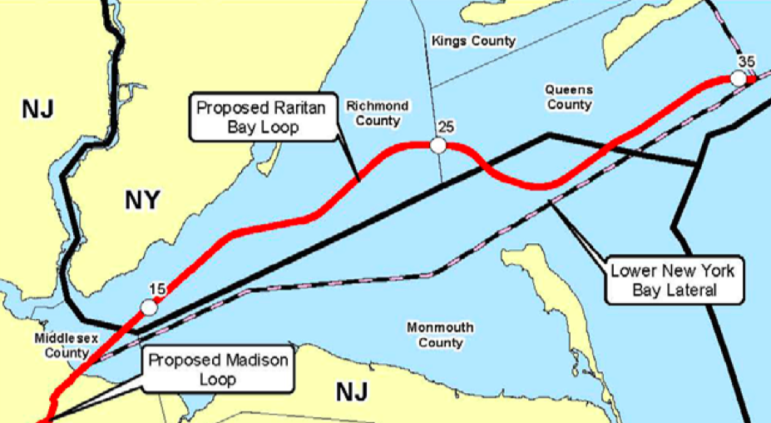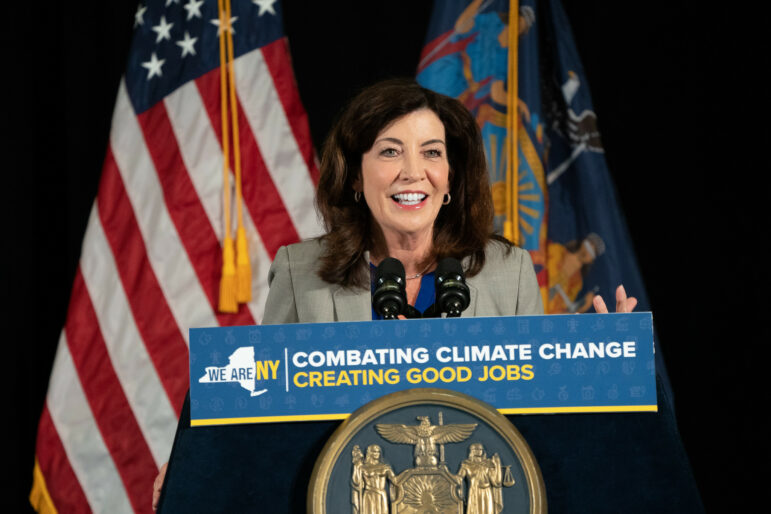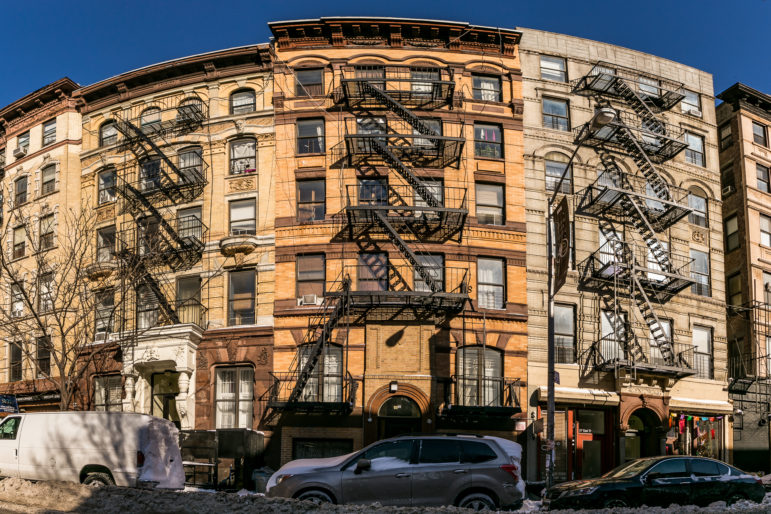
FERC
The route of the proposed pipeline.The Cuomo administration on Friday rejected for the third time a bid to build an underwater natural gas pipeline from the New Jersey coast to the Rockaways.
In a letter to the Transcontinental Gas Pipe Line Company (Transco), which sought to construct what has become known as the Williams Pipeline, the state Department of Environmental Conservation said it was denying the project because of Transco’s “inability to demonstrate the project’s compliance with all applicable water quality standards.”
New Jersey also rejected Transco’s latest application on Friday.
A third attempt
The 17-mile pipeline would deliver natural gas from fracking fields in Pennsylvania to National Grid customers in Brooklyn, Queens and Long Island.
Under the federal Clean Water Act, Transco needed a state water-quality permit in order to build the pipeline. The company’s 2017 permit application met with DEC denial in 2018. Transco resubmitted its plan later in 2018, and the Cuomo administration rejected it again last May. The company quickly filed again in 2019, only to be denied against this week.
Some opponents said the third denial was the last gasp for the project. It was not clear at press time what the project’s sponsors planned to do next.
Debate over need
The pipeline’s sponsors said it was needed because demand for natural gas was exceeding what existing pipelines could deliver. Natural gas has become more popular as property owners shift away from heating oil. After last year’s denial, National Grid imposed a moratorium on new gas hookups, mirroring one that fellow utility Con Edison had implemented in Westchester County. Gov. Cuomo threatened to yank National Grid’s license over the moratorium, and the state and utility reached a deal last November to end it.
Natural gas is considered by some to be a bridge fuel–a fossil fuel, but one that produces less carbon pollution than oil, offering a way to transition from the dirtiest fuels until sufficient renewable energy supplies are available.
Opponents argued that building new fossil-fuel infrastructure ran counter to the state’s plan to sharply reduce carbon emissions. Under a state law passed last year, New York is committed to reducing emissions by 85 percent over 1990 levels by the year 2050. A new, $1 billion pipeline, the opponents argued, represented a steel-and-concrete commitment to burning fossil fuels for years to come. And while natural gas does generate less carbon dioxide than oil, the pipeline would have added to the state’s carbon footprint.
The pipelines foes also questioned National Grid’s prediction of a fuel shortage.
Design questions
DEC said it had received more than 16,000 comments on the pipeline permit application. Based on the company’s filings, those comments and its own analysis, “the Department has determined that the construction of the project would have adverse water quality impacts in New York State,” the letter read. Among the specific issues DEC cited was Transco’s plan to sink the pipe four feet below the seabed in some areas.
“This burial depth is less than the six feet minimum depth sought by the department in other contexts, such as newly proposed underwater electric transmission lines within the New York Bight,” DEC wrote. “A six-foot burial depth is generally aimed at providing additional protection from a fishing and fisheries perspective, to avoid exposing or snagging the line and to minimize risk of vessel or gear impact that might compromise the pipeline.”
DEC’s findings did not fully address whether the pipeline “is necessary to meet long-term demand for natural gas in the downstate region,” but it did conclude that National Grid’s recent update to its projections “found natural gas demand reductions in the downstate region due to the impact of COVID-19 and identified additional incremental supply.” DEC also said that the utility had identified an alternative to the pipeline that would close the supply gap.
“Critically, as compared to the [pipeline] project, National Grid concludes that this alternative is less environmentally impactful, in terms of water quality, [greenhouse gas] emissions and otherwise,” DEC found.
Applause for Cuomo
Environmental groups hailed the decision.
“New York’s decision to protect water quality and reject the Williams pipeline marks a watershed moment in the state’s legacy of unmatched environmental leadership. It demonstrates that we can and must quit our unhealthy addiction to fossil fuels and grow the clean energy industries of the future,” said Kimberly Ong, senior attorney at the Natural Resources Defense Council, in a statement. “Now more than ever, we need to be laser-focused on building stronger and healthier communities and abandon systems that no longer serve us. Rejecting this pipeline will not only prevent more damage, but will also move us toward a cleaner, more just world for all New Yorkers.”
Given the economic devastation wrought by COVID-19, the decision to deny the permit reflects a strikingly strong commitment by Cuomo to the state’s climate goals.
Stop the Williams Pipeline Coalition said that Cuomo and his environmental team “have shown strength in stopping the Williams Pipeline and refusing to let one major crisis distract from another.”
“But let’s be clear: this victory is mainly because of grassroots activism and the unflagging determination of New Yorkers; Cuomo still needs to do much more,” the coalition said, adding that the governor must “stop with the austerity politics and seize on this opportunity to institute a green recovery, which must include banning all new fossil fuel infrastructure across the state for good.”
Cuomo is not the only leader whose steps toward reducing reliance on fossil fuels have drawn applause from environmentalists, followed by demands for even stronger action. After Mayor de Blasio pledged in his 2020 state of the city address to stop any expansion of pipelines in the city, advocates pressed for details on how that vow would impact projects already underway, or those that utilities consider necessary for the safety of existing systems.










7 thoughts on “Third Strike for Williams Pipeline”
Good luck heating your home’s mother’s
New Yorkers are a bunch of morons
Please shut off all natural gas to the state of N Y this fall. Oh and oil too.
Let them go through just one winter with out heat. Or charg them double for extra cost to postpone line again. Call it a fuel tax.
I work on pipe lines and have been out of work for a year.
Greg mazepink PA.
Governor Cuomo has no idea what he’s doing. He’s only playing to a base because he wants to run for president in the future. He doesn’t care about the people in New York. Natural Gas is very clean and gives millions of jobs to American workers instead he has people burning oil up there instead of clean Natural Gas
It’s pretty sad the administration is not looking at the issue by starving business and putting National Grid in a situation.
Renewal energy’s are not 100% bulletproof.
I work as a welder on pipeline work…. pretty sad I work out of my own state in surrounding states that are taking care of there own people when it comes to this issue. No gas equals no heat, no gas equals businesses not being able to cook food….. again Green energy is NOT 100% sustainable.
Hey Commenters–Even National Grid acknowledges that they can meet anticipated natural gas demand without the pipeline: https://millawesome.s3.amazonaws.com/Downstate_NY_Long-Term_Natural_Gas_Capacity_Supplemental_Report_May_8_2020.pdf
Glad to see NYC sees the value in looking to the future and challenging what people believe is possible. A clean city is a city people want to live in.